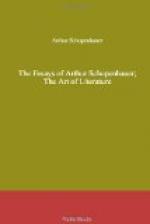The brain may be likened to a parasite which is nourished as a part of the human frame without contributing directly to its inner economy; it is securely housed in the topmost story, and there leads a self-sufficient and independent life. In the same way it may be said that a man endowed with great mental gifts leads, apart from the individual life common to all, a second life, purely of the intellect. He devotes himself to the constant increase, rectification and extension, not of mere learning, but of real systematic knowledge and insight; and remains untouched by the fate that overtakes him personally, so long as it does not disturb him in his work. It is thus a life which raises a man and sets him above fate and its changes. Always thinking, learning, experimenting, practicing his knowledge, the man soon comes to look upon this second life as the chief mode of existence, and his merely personal life as something subordinate, serving only to advance ends higher than itself.
An example of this independent, separate existence is furnished by Goethe. During the war in the Champagne, and amid all the bustle of the camp, he made observations for his theory of color; and as soon as the numberless calamities of that war allowed of his retiring for a short time to the fortress of Luxembourg, he took up the manuscript of his Farbenlehre. This is an example which we, the salt of the earth, should endeavor to follow, by never letting anything disturb us in the pursuit of our intellectual life, however much the storm of the world may invade and agitate our personal environment; always remembering that we are the sons, not of the bondwoman, but of the free. As our emblem and coat of arms, I propose a tree mightily shaken by the wind, but still bearing its ruddy fruit on every branch; with the motto Dum convellor mitescunt, or Conquassata sed ferax.




